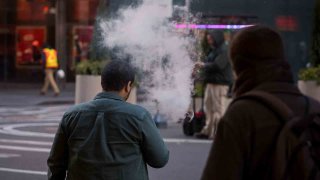
The Supreme Court on Monday probed whether the Food and Drug Administration unlawfully refused to approve flavored e-cigarettes over public health concerns.
During the oral argument, a majority of the nine justices appeared unconvinced that the agency had changed its standard for evaluating whether to approval products in the middle of the proceeding, as two companies argue.
But it is still possible the court could find fault in the agency's approach.
The court has a 6-3 conservative majority that is often skeptical of federal agency decision-making.
Get Tri-state area news delivered to your inbox.> Sign up for NBC New York's News Headlines newsletter.
But in a positive sign for the FDA, a key member of the conservative wing, Justice Brett Kavanaugh, seemed sympathetic to the agency's position.
Other conservatives seemed more skeptical, wondering if the FDA had failed to give companies fair notice of what kind of evidence it required to approve flavored vapes.
The case puts the FDA's role in approving new tobacco products under the microscope at a time when e-cigarettes, or vapes, have flooded the market.
U.S. & World
Makers of flavored vapes have brought various cases around the country challenging FDA decisions.
Although the FDA won most of those cases, it appealed to the Supreme Court after it lost one of them in the New Orleans-based 5th U.S. Circuit Court of Appeals.
The legal issue before the justices is whether the FDA failed to correctly consider the companies’ requests, in violation of a federal law called the Administrative Procedure Act.
The case focuses on challenges brought by Triton Distribution, which makes e-liquids for vape pens with colorfully named flavors, including Signature Series Mom’s Pistachio and Suicide Bunny Mother’s Milk and Cookies, and Vapestasia, which has sought approval for Iced Pineapple Express, Killer Kustard Blueberry and other flavors.
The FDA has repeatedly declined to approve flavored vapes, saying they might pose a health risk because they could encourage young people to use tobacco. The products nevertheless remain widely available.
The companies, which face potential civil and criminal penalties for marketing products without approval, say the FDA got it wrong, arguing that flavored vapes can be used to help people stop smoking.
Their lawyers argue that the FDA changed its standard for considering flavored vapes in the middle of the process without giving applicants adequate warning.
Kavanaugh pushed back, saying the FDA's position on the issue was clear from the outset, with a focus on the harm to young people of flavored vape products.
He noted that under the Tobacco Control Act, the FDA has the power to regulate tobacco products, with a special focus on young people.
If, after weighing the evidence, the FDA rejects an application, "it's kind of the end of it, isn't it?" Kavanaugh said.
Kavanaugh and another conservative justice, Amy Coney Barrett, did not seem to think the FDA had meaningfully changed its position during the process.
It was a view shared by the court's three liberal justices.
"I guess I'm not really seeing what the surprise is here or what the change is here," Justice Elena Kagan said.
She added that applicants know very well that the FDA believes that flavored vapes are especially appealing to children and that they would need to overcome that presumption in their submissions.
"I mean, there's just not a lot of mystery here about what FDA was doing. You might disagree with that, because you think that, in fact, the world of 40-year-olds really wants to do blueberry vaping, but you can't say that FDA hasn't told you all about what it's thinking in this respect," Kagan told the companies' lawyer, Eric Heyer.
Likewise, Justice Ketanji Brown Jackson said she was "baffled" by the companies' argument that they did not have fair notice of the agency's position.
Justice Sonia Sotomayor seemed to share that view, saying she was "so totally confused" by the arguments made by Heyer.
Conservative Justice Clarence Thomas was among those who expressed concern about the FDA's actions, characterizing the standard for approval as a "moving target."
Others, including Justice Neil Gorsuch, wondered whether the agency had failed to give applicants fair notice that the rules had changed.
The agency says it evaluates each application on its merits. The two companies' applications were rejected because "they failed to support their claims with sufficient evidence in any form," Solicitor General Elizabeth Prelogar wrote in court papers.
The FDA began regulating vape products only in 2016, after they were already on the market. The FDA said at the time that it would not take enforcement actions while companies sought approval.
It subsequently concluded that the potential benefits of helping adult smokers quit do not outweigh the potential health risks to young people, who are most attracted to non-tobacco flavored vapes.
The FDA has approved menthol-flavored e-cigarettes, as well as some that are tobacco-flavored.
The agency will have a high profile when President-elect Donald Trump takes office for his second term. Trump has pledged to shake up the health care system, pledging to nominate vaccine skeptic Robert F. Kennedy Jr. to run the Department of Health and Human Services, of which the FDA is part.
Heyer told the justices that if his clients win the case, there could be a change in the FDA's approach, citing comments Trump has made that he would "save vaping."
This story first appeared on NBCNews.com. More from NBC News:



